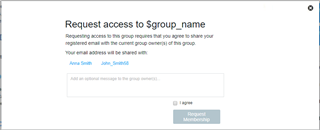We have a lot of Private Listed and Public Closed groups. In those two types a person needs to request access to a group. We do not display emails anywhere in our system but in this case the Owner needs to see the email the Requestor is using to request access.
There are 2 moments an Owner is notified
- Notification bar (Live alert)
- Notification mail
The owner then goes to the request page and sees the request
So we have 3 touch points where it should be possible to expose the email. In the past we used ON PREM and we were able to trick some backend process exposing the email during the request and show it in the Request Page but only to the Group Owner.
Now we are Cloud based an I am looking for help/tips on how to expose the email to a group owner. Preferably on the Request Page but otherwise in the Notification(s)

